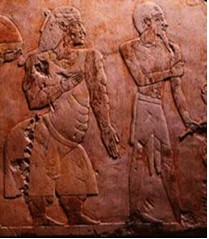|
|
At Cairo museum, on Queen Hatshepsut’s tomb in Deir el Bahari,is showed the chief Parihou with his wife Ati, Queen of Punt, (not still geographically established: Yemen, Somalia, Ethiopia, Eritrea, Sudan?) while they offer gifts to the Egyptian Queen Hatshepsut (1516-1481 BC).
Naval expedition to the mysterious land of Punt was undertaken in the summer of Hatshepsut’s eighth year as queen, she sent a fleet of five ships, headed by her Chancellor Senenmet.
Queen of Punt shows rugged face, gluteal and femoral obesity, hyperlordosis and symmetrical deposits of fat on the trunk, limbs and thighs (Fig. 1).
Figure (1)
|
 |
Bioanthropological and medical geneticist has a lot studied the Queen of Punt, died nearly 34 centuries ago, in order to place a precise diagnosis, but with many difficulties not having a mummy for such disposition.
Moreover the clinical picture seems to be a single phenotype grouping several dermatologic pathologies (Launois Bensaude’ Lipomatosis, Neurofibromatosis, Lipodystrophy, Dercum disease, Achondroplasia, Proteus syndrome and X linked dominant hypophosphatemic rickets, Familial obesity) therefore I share the same opinion of Farag, Sabry and Iskantar consequently hypothesize that it can be coined a new pathology named “Queen of Punt Syndrome”.
References
1.TI Farag, MA Sabry, A Iskandar,1999. Journal of the American of Human
Genetics, October, Supplement Abstract#803.
2. Bradbury Louise.1988."Reflections on
Travelling to 'God's Land' and Punt in the Middle
Kingdom". Journal of the American Research
Center in Egypt 25:127-156.
3. Kitchen Kenneth Anderson. 1971."Punt and How to
get There". Orientalia 40:184-207.
4. Meeks Dimitri.2003."Locating Punt"In
Mysterious Lands,edited by David B. O'Connor and Stephen G.J.Quirke. Encounters with Ancient Egypt
5. London:Institute of Archeology, University College London and
Press. 53-80.ISBN 1-84472-004-7.
© 2004 Egyptian Dermatology Online Journal
|

